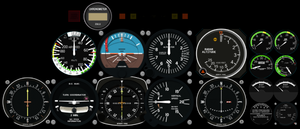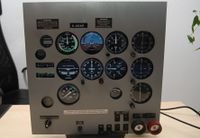FGPanel: Difference between revisions
No edit summary |
(→Related content: + 2D panel readme files, as FGPanel readme files is a bit short and FGPanel is based on the 2D panel code) |
||
| (11 intermediate revisions by 7 users not shown) | |||
| Line 1: | Line 1: | ||
[[File:FGPanel_SenecaII.png|thumb|300px|The 2D panel of a [[SenecaII]].]] | [[File:FGPanel_SenecaII.png|thumb|300px|The 2D panel of a [[SenecaII]].]] | ||
'''FGPanel''' is designed as a standalone lightweight panel rendering engine to draw 2D panels on a | '''FGPanel''' is designed as a standalone lightweight panel rendering engine to draw 2D panels on a low-cost computer/graphic card without 3D acceleration at reasonable frame rates. | ||
FGPanel was not part of the FlightGear 2.4.0 release for Windows. Windows users can get the executable from [http://flightgear.simpits.org:8080/job/FlightGear-Win-Cmake/lastSuccessfulBuild/artifact/install/msvc100/FlightGear/bin/fgpanel.exe Jenkins]. | |||
== FGPanel on Linux == | |||
[[File:C172MiniCockpit1.jpg|thumb|200px|right|A complete display setup for the [[Cessna C172P]] using FGPanel.]] | |||
FGPanel was available as a ''OpenSUSE Live System'', a complete, stand-alone software setup, including OpenSUSE Linux operating system and all necessary start-up scripts. Unfortunately the SuseStudio service was shut down in 2018, so the ISO images are no longer available for download. | |||
FGPanel is still part of OpenSUSE's standard FlightGear packages though. So, to run fgpanel on a separate PC, you can simply install openSUSE and download the FlightGear package from the OpenSUSE repository. See the {{flightgear source|utils/fgpanel/README|text=README}} for more. | |||
== FGPanel on Raspberry Pi == | |||
FGPanel has been ported to run on a Raspberry Pi. All what you need is: | |||
* a Raspberry Pi; | |||
* a network to connect the Raspberry Pi with an instance of FlightGear Simulator; | |||
* Raspbian installed on the Raspberry Pi; | |||
* follow the procedure described in <tt>utils/fgpanel/README.RPi</tt> to build FGPanel. | |||
This FGPanel on Raspberry Pi makes it easy and cheap to build a panel for your own procedure trainer. | |||
== Related content == | == Related content == | ||
* [[ Howto: Build your own procedure trainer]], describes how you can create a "cheap" procedure trainer, making use of | * [[ Howto: Build your own procedure trainer]], describes how you can create a "cheap" procedure trainer, making use of FGPanel to draw the instruments. | ||
=== Readme files === | |||
* {{flightgear source|utils/fgpanel/README|text=README}} | |||
* {{flightgear source|utils/fgpanel/README.RPi|text=README.RPi}} | |||
As FGPanel use stripped down for the 2D panels these readme files can also be useful | |||
* {{readme file|xmlpanel}} | |||
* {{readme file|xmlpanel.html}} | |||
== | === Source code === | ||
* | * {{flightgear source|utils/fgpanel}} | ||
[[Category: Software]] | [[Category: Software]] | ||
[[Category:Cockpit building]] | |||
Revision as of 13:32, 17 May 2019

FGPanel is designed as a standalone lightweight panel rendering engine to draw 2D panels on a low-cost computer/graphic card without 3D acceleration at reasonable frame rates.
FGPanel was not part of the FlightGear 2.4.0 release for Windows. Windows users can get the executable from Jenkins.
FGPanel on Linux

FGPanel was available as a OpenSUSE Live System, a complete, stand-alone software setup, including OpenSUSE Linux operating system and all necessary start-up scripts. Unfortunately the SuseStudio service was shut down in 2018, so the ISO images are no longer available for download.
FGPanel is still part of OpenSUSE's standard FlightGear packages though. So, to run fgpanel on a separate PC, you can simply install openSUSE and download the FlightGear package from the OpenSUSE repository. See the README for more.
FGPanel on Raspberry Pi
FGPanel has been ported to run on a Raspberry Pi. All what you need is:
- a Raspberry Pi;
- a network to connect the Raspberry Pi with an instance of FlightGear Simulator;
- Raspbian installed on the Raspberry Pi;
- follow the procedure described in utils/fgpanel/README.RPi to build FGPanel.
This FGPanel on Raspberry Pi makes it easy and cheap to build a panel for your own procedure trainer.
Related content
- Howto: Build your own procedure trainer, describes how you can create a "cheap" procedure trainer, making use of FGPanel to draw the instruments.
Readme files
As FGPanel use stripped down for the 2D panels these readme files can also be useful
- $FG_ROOT/Docs/README.xmlpanel
- $FG_ROOT/Docs/README.xmlpanel.html